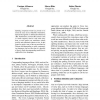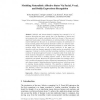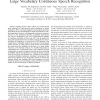85 search results - page 12 / 17 » Emotion Recognition from Noisy Speech |
ACL
2008
13 years 9 months ago
2008
Splitting compound words has proved to be useful in areas such as Machine Translation, Speech Recognition or Information Retrieval (IR). Furthermore, real-time IR systems (such as...
AIHC
2007
Springer
14 years 1 months ago
2007
Springer
Affective and human-centered computing have attracted a lot of attention during the past years, mainly due to the abundance of devices and environments able to exploit multimodal i...
TASLP
2011
13 years 2 months ago
2011
— Missing feature theory (MFT) has demonstrated great potential for improving the noise robustness in speech recognition. MFT was mostly applied in the log-spectral domain since ...
COLING
1990
13 years 8 months ago
1990
This paper describes a new program, correct, which takes words rejected by the Unix spell program, proposes a list of candidate corrections, and sorts them by probability. The pro...
TASLP
2002
13 years 7 months ago
2002
This paper presents a framework for maximum a posteriori (MAP) speaker adaptation of state duration distributions in hidden Markov models (HMM). Four key issues of MAP estimation, ...



